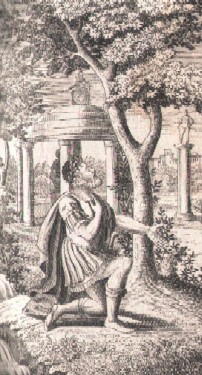Valerius Antias
Valerius Antias was an ancient Roman historian who flourished during the late Roman Republic. He is best known for his work on the history of Rome, which has not survived in its entirety, but is frequently cited by later historians, such as Livy and Plutarch, providing valuable insights into Rome's early history and the Roman way of life. Despite the significance of his work, details about his life remain sparse, and much of what is known comes from the references made by other ancient authors.
Life[edit | edit source]
Very little is known about the life of Valerius Antias. His cognomen, Antias, suggests he was a member of the Valeria gens, one of the oldest and most distinguished patrician families in Rome. The exact dates of his birth and death are unknown, but he is believed to have lived during the 1st century BC, a period marked by significant political and social upheavals in the Roman Republic.
Works[edit | edit source]
Valerius Antias is primarily known for his annalistic account of Roman history, which is thought to have spanned at least 75 books. His history, like many others from the period, began with the mythical founding of Rome and continued down through his own time. Although the complete work has been lost, fragments and references in the writings of later historians suggest that it was a comprehensive account of Roman history, politics, military campaigns, and notable events.
One of the key characteristics of Antias's work was its detailed accounts of Roman battles, triumphs, and the exploits of Roman heroes. However, his reliability as a historian has been a subject of debate among modern scholars. It is believed that Antias often exaggerated numbers and achievements for dramatic effect, which has led to accusations of unreliability and fabrication. Despite these criticisms, his work remains an important source for understanding Rome's early history and the Roman Republic's political and military narratives.
Legacy[edit | edit source]
The legacy of Valerius Antias is complex. On one hand, his detailed chronicles of Rome's history have been invaluable to later historians, providing a rich source of material for reconstructing Rome's past. On the other hand, his penchant for exaggeration and possible fabrication has led to skepticism about the accuracy of his accounts. Nevertheless, his influence on the historiography of ancient Rome is undeniable, and his work continues to be studied by scholars interested in the Roman Republic and its historiography.
Criticism and Historical Debate[edit | edit source]
The historical debate surrounding Valerius Antias focuses on the accuracy and reliability of his accounts. Some modern historians argue that despite his embellishments, Antias's work contains a core of historical truth that is invaluable for understanding certain aspects of Roman history. Others caution against taking his accounts at face value, suggesting that they should be corroborated with other sources wherever possible.
Conclusion[edit | edit source]
Although the complete works of Valerius Antias have been lost to history, his influence on the historiography of ancient Rome is significant. His detailed accounts of Rome's early history, despite their debated accuracy, have shaped the narrative of Rome's past for centuries. As a source, Valerius Antias remains both a valuable and a contested figure in the study of Roman history.
Search WikiMD
Ad.Tired of being Overweight? Try W8MD's physician weight loss program.
Semaglutide (Ozempic / Wegovy and Tirzepatide (Mounjaro / Zepbound) available.
Advertise on WikiMD
|
WikiMD's Wellness Encyclopedia |
| Let Food Be Thy Medicine Medicine Thy Food - Hippocrates |
Translate this page: - East Asian
中文,
日本,
한국어,
South Asian
हिन्दी,
தமிழ்,
తెలుగు,
Urdu,
ಕನ್ನಡ,
Southeast Asian
Indonesian,
Vietnamese,
Thai,
မြန်မာဘာသာ,
বাংলা
European
español,
Deutsch,
français,
Greek,
português do Brasil,
polski,
română,
русский,
Nederlands,
norsk,
svenska,
suomi,
Italian
Middle Eastern & African
عربى,
Turkish,
Persian,
Hebrew,
Afrikaans,
isiZulu,
Kiswahili,
Other
Bulgarian,
Hungarian,
Czech,
Swedish,
മലയാളം,
मराठी,
ਪੰਜਾਬੀ,
ગુજરાતી,
Portuguese,
Ukrainian
Medical Disclaimer: WikiMD is not a substitute for professional medical advice. The information on WikiMD is provided as an information resource only, may be incorrect, outdated or misleading, and is not to be used or relied on for any diagnostic or treatment purposes. Please consult your health care provider before making any healthcare decisions or for guidance about a specific medical condition. WikiMD expressly disclaims responsibility, and shall have no liability, for any damages, loss, injury, or liability whatsoever suffered as a result of your reliance on the information contained in this site. By visiting this site you agree to the foregoing terms and conditions, which may from time to time be changed or supplemented by WikiMD. If you do not agree to the foregoing terms and conditions, you should not enter or use this site. See full disclaimer.
Credits:Most images are courtesy of Wikimedia commons, and templates, categories Wikipedia, licensed under CC BY SA or similar.
Contributors: Prab R. Tumpati, MD


